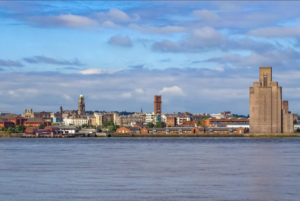What’s love got to do with local economic development? The council at Coffs Harbour in Australia has put the ‘L’ word at the heart of its local economic strategy, as Kristina Cooke explains.
This month our council will officially adopt our local economic strategy. It marks the start of the next phase for Coffs Harbour to truly express its love for the city in a whole load of exciting ways. When it happens, it will have been a journey of over a year, when we launched the start of an extensive engagement process to identify our co-creators and unleash their mojo.
The subtitle to the Coffs Harbour economic strategy – Growth through localisation and love of our city – really says it all. It is based on the belief that our community has an amazing abundance of existing and potential talent that we can support, nurture and develop. Through this process our community will grow (both economically and socially). This is a direct expression of a love of our city. As Kageyama says in For the Love of Cities, ‘when we love something, we cherish it; we protect it; we do extraordinary things for it.’
The journey took slightly longer than originally planned and has been a bit bumpy, but, on reflection, it’s a journey and discussion we had to have, one that hopefully has galvanised the business community and which lays the foundation for a resilient city into the future.
Our challenges
When Bernard Salt, a leading Australian demographer and trend forecaster, launched our economic development process he included a SWOT analysis undertaken by over 80 of our business leaders. As he pointed out, the one thing that acts as an indicator of the fractured nature of our community’s history of working together is our namesake, the harbour. There it lies, still the uncut gem, the diamond in the rough as masterplan after masterplan have been created and then dashed against the rocks.
The other attitude that we have all been part of is the ‘cargo cult’ mentality and the idea that we just need to shout loud enough and government will save us.
We also have to acknowledge that we are in the wake of the great financial crisis. Although this has not affected Australia like other parts of the globe it has made us reconsider the way forward and investigate how to make our local economy more resilient.
 The process
The process
We started from the base and worked our way up. This bottom-up approach involved working with each of our industry sector groups from an asset-based approach to develop individual industry action plans. At the same time we had a reference group guiding the process, made up of representatives from each of the industry sectors and other key stakeholders.
This approach is a direct reflection of our council’s community strategic plans and our attempts to put these big picture visions into concrete and realistic actions. Our aim in grounding it this way is recognition that achieving our vision will require a whole of community approach. Council on its own cannot and will not be delivering all the programmes. It is part of the process of shifting the expectation that council and other levels of government will be there to do everything. Through working with our industry and community networks we could be realistic and action-oriented in order to overcome the big-ticket wishlist trap. This approach enables us to focus on our local co-creators and follow the local passions.
One innovation we trialled was to set up a secure online space to try to encourage constructive discourse. The intention was for this to be an additional space where discussions could evolve as we went on the journey. The aim was to overcome the barriers to participation and offer alternative ways to contribute for those that couldn’t always attend meetings. Unfortunately this was not widely used by members for a variety of reasons, the result being we didn’t overcome the problem of keeping everyone on the journey together.
Sowing the seeds of love
Early on in the consultation a recurrent theme kept popping up: the need for more pride and love for our city. This led to a search for international best practice, for cities doing this well. This search led us to the work of Peter Kageyama who has captured beautifully the essence of what we were hearing people say.
On reading his book, ‘For the Love of Cities’ we instantly understood that this is what people were expressing. Armed with his work as back-up went a long way to strengthening our resolve. It would have been so much easier if we had just not used the ‘L’ word though!
What’s love got to do with it?
We held a two-hour discussion with our reference group on ‘what’s love got to do with it’ and we didn’t even get to past the cover. We had to do a bit of ‘mythbusting’ for those that had not come on the complete journey with us. This was mainly to overcome the assumptions that the traditionalists jumped to when they saw the words ‘love’ and ‘localisation’
The main issues were:
- The perception that the word ‘love’ is too soft for a ‘real’ economic strategy.
- ‘Love our city’ was thought to be a branding position for Coffs – when really it’s our call to action.
- The ‘localisation’ agenda is insular and inward, excluding
- Misunderstanding about who the strategy was for. It was never intended as a ‘prospectus’.
Ideologically it came down to two differing schools of thought: the traditionalists who expected the strategy to be primarily a prospectus for the city to use as a way of attracting investors and big ticket corporates to ‘save us from ourselves’, and those who believed that the city actually had the foundations of physical, human and financial capital internally and that we just need to support each other and work smarter not harder. The central premise being if we don’t love our city and want to invest in it (be that time, money, blood sweat or tears) why would we expect a complete stranger to do it for us? By doing great things and creating the ‘buzz’ around town we can attract external investment (be it government or private sector) through demonstrating our capacity. It’s nothing new, it is just the mindset shift that is required.
Interestingly, when examined individually the ‘traditionalists’ supported the specific actions identified, it’s just when you bundle it up and put it under the ‘L’ word some baulk. Check in with us in 12 months to see if overall our city is bunch of lovers.
Starting with a co-working space
With the strategy being developed through a broad inclusive engagement process the difficulty is always how to maintain momentum and at the same time keep the local government bureaucracy machine happy. With the ultimate aim of working with our co-creators to implement these actions on the ground it’s a difficult balance. We have revved them up and then left them hanging till approvals have been made. This is going to be one of our biggest challenges – regaining the trust of these groups and convincing then that it wasn’t just another talk fest.
We had to keep at least something alive – and we saw establishing a co-working space had the biggest potential impact to address a raft of strategies (and also our personal passions). A small group of co-working evangelists, themselves looking for a co-working space to work from, were formed into a working group. They have driven the project forward, kept us on our toes and grounded. Essentially they are the co-creators of the space and future users, so if it doesn’t work for them it isn’t going to work. You can follow our progress from here.
We are advocates for a more agile strategy development, something for our council to consider for the future. Based on an iterative approach, we would be wise to examine ways of developing and ‘prototyping’ strategies as we go rather than waiting for the big tick of approval. Which in the end is part of the blockage, this concept that we have to create the ultimate answer that everyone has to agree on and believe is ‘the’ solution without much field testing creates fear in everyone involved. It sets up the notion that we have to get it right first time, which is unrealistic and causes delays in decision making.
Dan Hill’s words ‘decision making is our greatest challenge’ echo in my ears from last year’s Smart Cities world congress, and I especially think this is the case for councils when dealing with innovation. I think we could do worse than adopt some approaches from the worlds of design-led innovation and entrepreneurship of being lean, agile, user-centred and learning to prototype. There is nothing wrong with failing fast and failing early and it’s usually a lot cheaper!
Learning from the experience
● Keep the momentum – be mindful of how to manage the different expectations between community and government
● Start with why – outline what you believe in and why you get up in the morning. This is hindsight talking, just recently exposed to Simon Sinek’s ‘start with why’ and think if we had done this upfront and early it might have made a difference
● Have ongoing dialogue – endeavour to take everyone on the journey with you
● Think lean – look for ways to have an iterative and agile process that learns from design methods to get as close to ‘end-users’ as possible and prototype as much as possible
A draft version of the economic strategy is available here.



















Took slightly longer than expected but we got there in the end. Now online http://www.coffsharbour.nsw.gov.au/learning-and-prospering/projects/Pages/economic-strategy.aspx